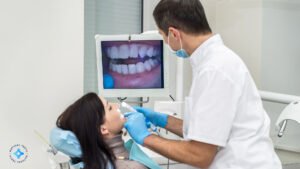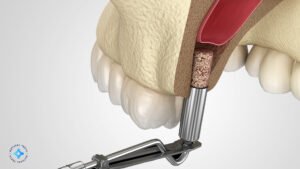A failing dental implant can be more than just a physical inconvenience—it can shake your confidence and disrupt daily life. Whether it’s discomfort, infection, or an unstable prosthesis, rescue/salvage implants offer a lifeline to restore function, aesthetics, and peace of mind.
At Natural Teeth Implant Center, we specialize in advanced solutions to salvage compromised implants, ensuring long-term stability and a natural-looking smile.
In this comprehensive guide, we’ll explore what rescue/salvage implants are, who needs them, and how they can transform your oral health. From diagnosis to recovery, we’ll cover everything you need to know to make an informed decision about your dental care.
What Are Rescue/Salvage Implants?
Rescue/salvage implants are specialized procedures designed to address complications from previous dental implant treatments. Whether due to infection, bone loss, or improper placement, these interventions aim to restore stability, function, and aesthetics without requiring complete replacement.
Common Issues Addressed by Salvage Implants:
-
Loose or shifting implants causing discomfort.
-
Peri-implantitis (infection) leading to bone deterioration.
-
Poorly fitting prosthetics affecting speech and chewing.
-
Aesthetic concerns with existing restorations.
By identifying the root cause, dental professionals can implement targeted solutions to save your implants and extend their lifespan.
Why Choose Rescue/Salvage Implants Over Replacement?
While replacing a failed implant may seem like the only option, salvage procedures often provide a less invasive, more cost-effective solution. Here’s why they’re beneficial:
-
Preserves existing bone structure by addressing bone loss early.
-
Reduces treatment time compared to full implant removal and replacement.
-
Maintains prosthetic integrity with adjustments rather than complete remakes.
-
Improves long-term success rates with proper infection control and stabilization.
For many patients, salvaging an implant means avoiding additional surgeries while still achieving optimal results.
The Rescue/Salvage Implant Process: Step by Step
At Natural Teeth Implant Center, our approach is thorough and patient-centered. Here’s what you can expect:
-
Comprehensive Evaluation – Advanced imaging (CBCT scans) to diagnose the issue.
-
Customized Treatment Plan – Solutions may include deep cleaning, bone grafting, or implant repositioning.
-
Restorative Procedures – Treating infections, reinforcing bone, and securing the implant.
-
Prosthetic Adjustments – Refining the restoration for optimal fit and aesthetics.
-
Post-Procedure Care – Follow-up visits to ensure long-term success.
This structured approach ensures that your salvage implant not only functions properly but also blends seamlessly with your natural smile.
Who Is a Candidate for Rescue/Salvage Implants?
You may benefit from rescue/salvage implants if you experience:
-
Persistent pain or looseness in your implant.
-
Signs of infection (redness, swelling, bleeding).
-
Difficulty chewing or speaking due to an unstable prosthesis.
-
Visible bone loss around the implant site.
An early consultation can determine whether implant salvage is possible or if an alternative approach is needed.
Success Rates and Longevity of Salvage Implants
When performed by experienced professionals, rescue/salvage implants have a high success rate. Factors influencing outcomes include:
-
Early intervention before severe bone loss occurs.
-
Proper infection control to prevent recurrence.
-
Quality of bone grafting (if needed).
-
Patient compliance with aftercare instructions.
With proper care, salvaged implants can last many years, providing lasting comfort and confidence.
Real-Life Applications: How Salvage Implants Transform Smiles
Consider these scenarios where rescue/salvage implants made a difference:
-
Case 1: A patient with peri-implantitis underwent deep cleaning and antibiotic therapy, saving the implant.
-
Case 2: Bone grafting stabilized a loose implant, preventing extraction.
-
Case 3: Prosthetic adjustments corrected a poorly fitting denture, improving speech and comfort.
These examples highlight how targeted salvage techniques can restore both function and aesthetics.
Frequently Asked Questions About Rescue/Salvage Implants
-
What causes dental implants to fail?
Infection, bone loss, improper placement, or excessive pressure.
-
Can a failing implant be saved?
Yes, if detected early, procedures like bone grafting or infection control can salvage it.
-
Is salvage implant treatment painful?
Local anesthesia ensures comfort during the procedure; mild discomfort may occur afterward.
-
How long does recovery take?
Typically a few weeks, depending on the complexity of the case.
-
Are salvage implants as strong as new ones?
When properly restored, they can function just as effectively.
-
What happens if salvage isn’t possible?
Full implant replacement may be necessary.
-
Does insurance cover salvage procedures?
Some plans may cover part of the cost; check with your provider.
-
How do I know if I have peri-implantitis?
Symptoms include swelling, bleeding, and pus around the implant.
-
Can smoking affect implant salvage success?
Yes, smoking slows healing and increases failure risk.
-
What’s the cost difference between salvage and replacement?
Salvage is often more affordable than full replacement.
-
How often should I get my implants checked?
Annual check-ups help detect issues early.
-
Can grinding teeth damage implants?
Yes, a nightguard may be recommended.
-
What’s the role of bone grafting in salvage procedures?
It strengthens weak bone to support the implant.
-
How soon can I eat normally after salvage treatment?
Soft foods are recommended initially; normal eating resumes in a few weeks.
-
Are there non-surgical salvage options?
Early-stage infections may respond to antibiotics and deep cleaning.
-
What materials are used in salvage procedures?
Titanium implants, bone grafts, and biocompatible membranes.
-
Can diabetes affect implant salvage success?
Uncontrolled diabetes may slow healing.
-
How do I clean salvaged implants?
Special brushes and antimicrobial rinses help maintain hygiene.
-
What’s the success rate of salvage implants?
Over 85% when performed by skilled professionals.
-
Can a loose implant tighten on its own?
No, professional intervention is required.
-
Is age a factor in implant salvage?
Older patients may need additional bone support.
-
How do I find a qualified salvage implant specialist?
Look for experience in implant rescue procedures.
-
Can allergies affect salvage treatment?
Inform your dentist of any metal allergies.
-
What’s the difference between rescue and revision implants?
Rescue saves the existing implant; revision replaces it.
-
How does stress impact implant failure?
Bruxism (teeth grinding) can contribute to implant issues.
-
Are there dietary restrictions post-salvage?
Avoid hard or sticky foods initially.
-
Can a salvaged implant last a lifetime?
With proper care, it can last decades.
-
What’s the first sign of implant failure?
Mobility or discomfort when chewing.
-
How does bone density affect salvage success?
Low density may require grafting for stability.
-
What’s the alternative if salvage isn’t an option?
Implant removal and replacement may be necessary.
Conclusion
If you’re struggling with a failing dental implant, rescue/salvage implants offer a proven solution to restore stability, function, and confidence. Early intervention is key whether it’s treating infection, reinforcing bone, or adjusting your prosthesis, these procedures can save your implant and your smile.
At Natural Teeth Implant Center, we’re committed to providing personalized, cutting edge care to help you reclaim the comfort and aesthetics you deserve.






